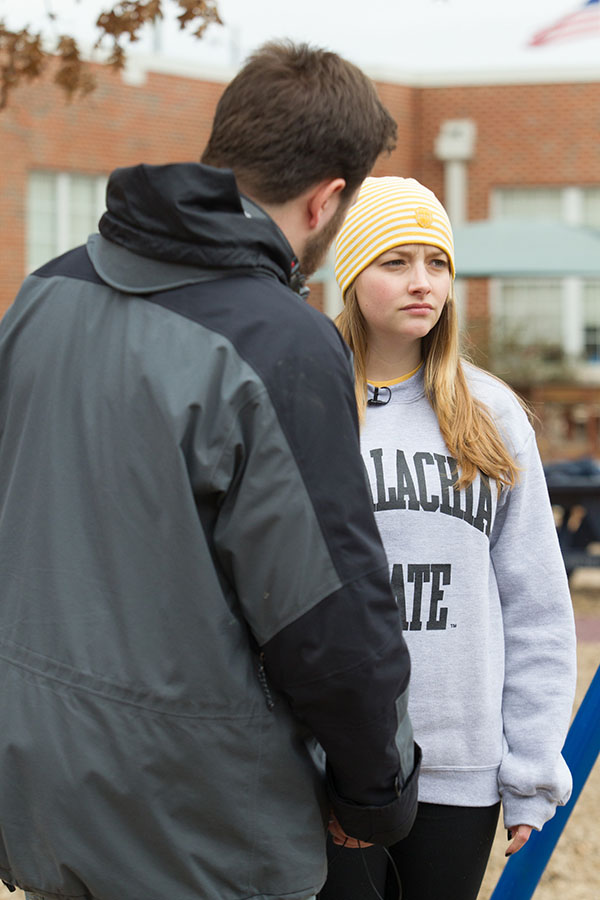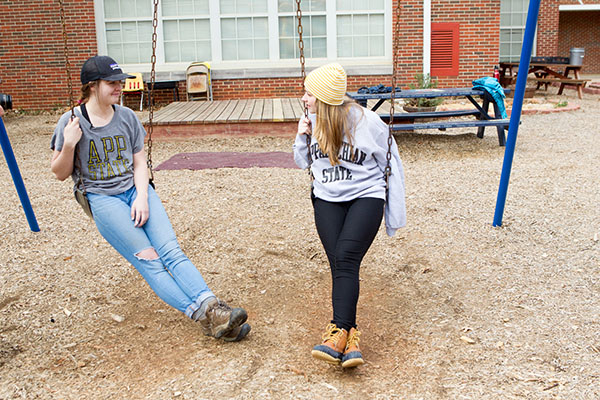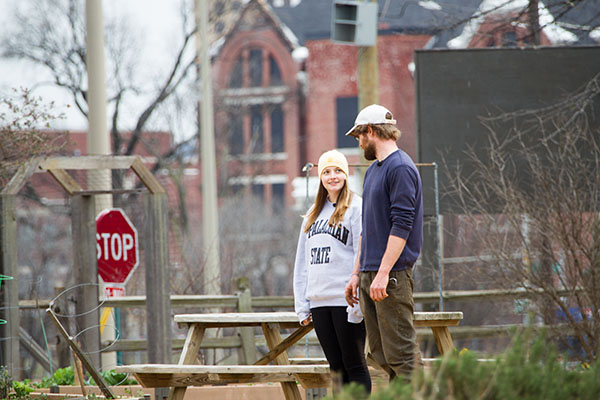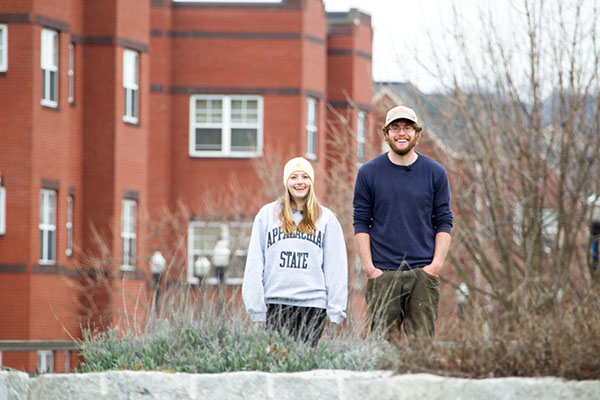Each spring, groups of Appalachian State University students choose to forgo the typical vacation most imagine when they hear the term "Spring Break" to do service projects around the nation. These trips, which all have a focus on sustainability, social justice and the environment, are known as Alternative Service Experiences (ASE).
Join Appalachian student Laurie Pope as she accompanies an ASE group to Birmingham, Alabama, where students volunteer at the Jones Valley Teaching Farm.
All music featured in this video is the work of Rainbow Kitten Surprise from its album RKS, recorded by Appalachian's student-run Split Rail Records. The album is available for purchase on iTunes. https://itunes.apple.com/us/album/rks.
About Appalachian State University
As a premier public institution, Appalachian State University prepares students to lead purposeful lives. App State is one of 17 campuses in the University of North Carolina System, with a national reputation for innovative teaching and opening access to a high-quality, cost-effective education. The university enrolls more than 21,000 students, has a low student-to-faculty ratio and offers more than 150 undergraduate and 80 graduate majors at its Boone and Hickory campuses and through App State Online. Learn more at https://www.appstate.edu.
Transcript
Laurie Pope: Every spring, roughly 250 Appalachian State students leave the mountains of North Carolina to spend their spring break, NOT on a beach or absorbing hours of Netflix, but serving communities around the nation. This Alternative Spring Experience, or A-S-E, has groups of App students providing volunteer service with a focus on sustainability, social justice issues, and the environment. I’m Laurie Pope, a senior Communications major at Appalachian, and I was fortunate enough to tag along with an ASE group bound for Birmingham, Alabama.
Birmingham…
At just over 200 thousand inhabitants, it’s the largest city in Alabama. Historically, a city that made its name in steel production and as a major railroad hub for the Deep South, Birmingham is now home to many industries, such as banking, telecommunications, and healthcare. Amongst all this industry and urban sprawl, you’ll also find something…a little different, maybe even a little out of place.
Jones Valley Teaching Farm…
Situated on 3 acres in downtown Birmingham, and operating since 2007, Jones Valley has taken the idea of “urban farming” to new heights. Surrounded by pavement, overpasses and train tracks on every side, the staff grows seasonal flowers, fruits and vegetables, not only as a source of food and revenue to feed and profit their community, but as a source of education to inspire and better their community. From a single seed, to the final harvest, Jones Valley involves local citizens, school children, and volunteers from around the country to educate them on where the fresh food on their plates come from, and how it got there in the first place.
This is where the Appalachian ASE group I’m following will volunteer their services. Our host and field manager for Jones Valley Teaching Farm is Ben Marshall.
LP: What impact does this three acres of land have on the world?
Ben Marshall: That is a large question to answer! But not only are we taking care of the environment with the practices that we’re using here, we are also taking care of our community by giving them food access. Birmingham City Schools, too. We are directly developing curriculum. We’re in five schools right now and we teach kids [kindergarten] through eighth grade every day of the week. They come outside, they get a science lesson, environmental lesson, something like that, and they’re out in the fields working. We have farm lab clubs, so after school, it’s not just a two-hour class out here; it is a twelve-year program that, you know, can really have some substantial impact on some of these kids.
LP: So, what effect does having the students here, having the Appalachian students here--how do they help the Jones Valley Teaching Farm accomplish their goals?
BM: Hugely. Really. The amount of work that we can get done with ten students is is 400 hours of work that they can possibly put in. That is pretty much every plant that they can put in the ground, it’s every weed that we need to pull. Having this group here will get us in a perfect spot for Spring. And it affects on multiple different levels. They helped do the farm labs today, so not only are they helping here, but they are directly helping the kids at the schools. So they are a tremendous help.
LP: The farm lab Ben was referring to is on the campus of Glen Iris Elementary, located on the edge of downtown Birmingham. This satellite learning farm morphs itself into the school’s playground area, almost to the point you can’t distinguish one from the other. Appalachian students are hard at work, improving landscaping and preparing the grounds for an upcoming tour for the Newman’s Own Foundation. One of the Appalachian students helping out at the school is Marissa Schneider, a freshman sustainability major from Charlotte, North Carolina.
LP: So how do you feel that the work y’all are doing here at Glen Iris is affecting the students at the school?
Marissa Schneider: Well, I just talked to some of the students and they sounded so excited! They said, “What are you doing?” and I said, “We’re painting some fence posts for the garden.” And they instantly lit up when we talked about the garden and I said, “Do you like working in the garden?” and they gave the most enthusiastic, “Yes! We love working in the garden.” I asked them what their favorite fruits and vegetables were and they said, “I don’t know, there are so many to choose from.” And that’s so hard to hear from anybody, but especially when there’s a food desert in an urban center such as Birmingham. So it was so cool to see that obviously the work that we’re doing is having a very tangible effect on the kids.
LP: So you referred to Birmingham as a bit of a food desert. Could you expand on what that means?
MS: If you look at Birmingham’s demographics and layout, grocery stores tend to be centered in more wealthy neighborhoods, rather than in urban area, and a lot of fresh produce is so expensive. So that is the food desert, is that they’re relying on processed food instead of actual, real food that comes from the earth.
LP: So, in the future do you picture yourself doing something like this?
MS: Oh, absolutely! This is exactly what I want to be doing. Experiencing what I’m learning in the classroom is only going to grow my passion more. I just want to bring community together through food.
LP: Each A-S-E trip also has an Appalachian faculty or staff member accompanying the group. Rachel Wilson, an assistant professor in the Reich College of Education, joined the Birmingham group, and found out it’s not just a learning experience for students.
Rachel Wilson: I would definitely recommend going on an ASE trip to other faculty members. I think it’s really important that we know who our students are, and what their interests are, and I think it’s a great way to get to know a cross-section of students--maybe not the ones in your major that you teach, but just students in general from App, what their passions are and to realize that we really are here to work with the students who come to Appalachian. And it’s useful as a faculty member to think about, “How can I meet the students where they are and get them personally invested in what I’m trying to help them learn?”
LP: So why do Appalachian State students give up their spring break? Why do they pass up sunny beaches for a pair of work gloves and a shovel? Why do they participate in an Alternative Service Experience?
…Why don’t you ask them?
Student 1: I decided to go on an ASE trip because I think that the sole purpose that we as humans have is to create a community and to give back to others.
Student 2: Because I’m really interested in promoting nutrition and healthy lifestyles.
Student 3: I’m here because I enjoy doing service.
Student 4: I’ve been spending a ton of my time thinking about how to help people and how to serve others.
Student 5: And it was just really rewarding to serve people and actually see how much help you’re actually being able to provide to organizations.
Student 6: I decided to do something different--I wanted to do something different.
Student 7: It’s literally just a learning experience. I’m learning along with everyone else.
Student 6: I’m learning so much from the people who are in my group, it’s insane.
Student 8: Here there’s a lot of sustainable development majors who I’ve been talking to and they teach you so many things that you can do practically, living in your dorm or at your apartment.
Student 5: And it expands your mind and lets you see other people’s viewpoint and how people live.
Student 8: So basically lowering my carbon footprint would be a main goal going back. Because I was never really conscious about it.
Student 6: So be more aware of that too, and I’ll definitely be telling my friends about it as well.
Student 7: Really all it takes to see something as big of a change as everything here is just one person who is passionate and cares about something and wants to see something change.
Student 9: Grow more local, you know with non-pesticides, non-GMO, try and be healthier with our food.
Student 2: I could help promote that, maybe start a little garden near my apartment complex.
Student 7: And then it just kind of snowballs from there. I think that’s really, really cool.
Student 10: And I’ve already made some connections with people on the trip. Made some friends already.
Student 4: And I’ve met a ton of cool people. As a music major, I don’t get out of the music building a lot. We’re kind of there all the time. There’s not one music major on this trip, so I’m meeting people I never would have otherwise.
Student 5: So it’s really just--it makes you a little more empathetic toward other people that you perceive that are different from you just looking at them externally, but once you really stop and have a conversation, you get to notice that you’re really not that different and you pretty much have the same needs.
LP: For more information on how to get involved in service, visit ACT-dot-APPSTATE-dot-EDU-slash-SERVICE, or go see them in person in the Plemmons Student Union on campus.
What do you think?
Share your feedback on this story.















